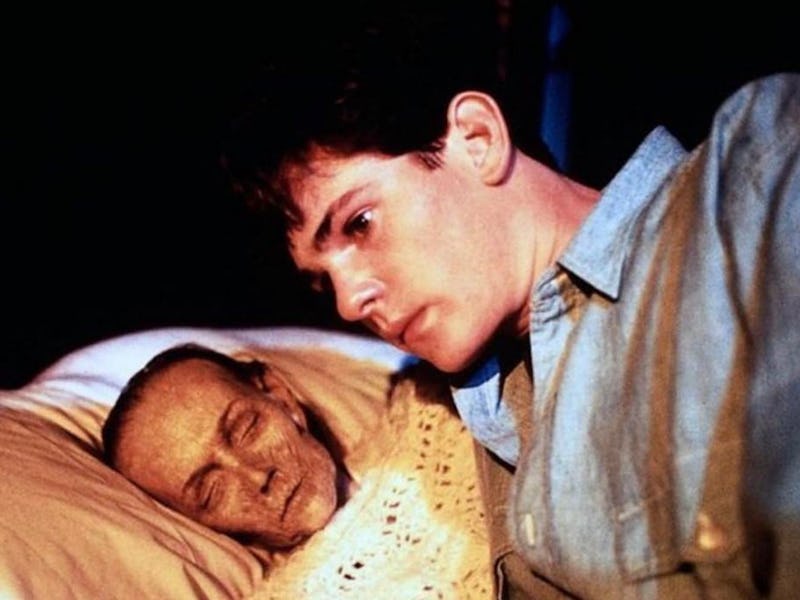35 Years Later, Psycho IV Remains A Baffling Prequel
No one is immune to the dreaded... origin story.

It’s an undisputed fact that Alfred Hitchcock’s Psycho is one of the greatest horror films ever made, and one of the most significant pieces of cinema full stop. Sixty-five years since its controversial release, it continues to enthral audiences and inspire storytellers. Psycho is a lean, mean, and stylistically stunning piece of cinematic trickery. Audiences never saw its twists and turns coming, and in Anthony Perkins’ Norman Bates, they had a new standard for big-screen evil.
But when you’ve made a bona fide masterpiece, Hollywood will want you to make it happen again. Not even Hitchcock’s masterpiece was immune to this: there are three Psycho sequels, which the majority of fans may not even be aware of. None came close to recapturing the magic of Psycho, but they all offer intriguing glimpses into a cultural shift that sought to bring new shades to a notorious bad guy.
In 1983, Psycho II imagined a Norman who tried to move on with his life after being released from a mental institution, only for his demons to haunt him and Marion Crane's sister Lila to demand vengeance. Reviews were surprisingly solid, although no one thought it was akin to Hitchcock's original. Three years later came Psycho III, with Norman once again running the Bates Motel and getting a girlfriend while another murder spree takes place. Critics were more mixed, with Michael Wilmington of the Los Angeles Times writing that "if the movie proves anything, it's that everyone should give Hitchcock a rest." They didn't.
Instead, 35 years ago today, we got Psycho IV: The Beginning, a TV movie that largely ignored its two predecessors. Norman, once again rehabilitated and now married to his psychiatrist, Connie, is preparing for fatherhood. His fear that his own awful childhood will lead to him repeating the cruelties of his mother, Norma (Olivia Hussey), leads to flashbacks of his youth and how he came to be a mentally disturbed murderer.
The credentials were promising, with Joseph Stefano, the screenwriter of Hitchcock's film, writing this blend of sequel and prequel. Stefano wanted to get away from the more conventional slasher elements of Psychos II and III, and ignore some of their bigger plot changes. Psycho IV would be solemn, bleak, and devoid of the campier moments that had permeated the sequels.
The Bates Motel would not have survived into the Tripadvisor era.
The entire concept of the franchise mythology is odd. The appeal of the original film is its sharp-edged focus on tension above all else, and there’s a reason even its most ardent defenders tend to call out the final five minutes, where one character offers a rushed explanation of Norman’s mental state. It’s a very of-its-time psychological profile too, one of cross-dressing, mommy issues, and “split personalities,” but you can understand why storytellers would be inspired by the idea of delving deeper into our villain’s brain.
Norman is terrifying but also sympathetic, a victim of childhood abuse steeped in Freudian terror who didn’t have a single ally in his small and hopeless world. If Psycho were made in 2025, it would be a 10-part miniseries where Marion Crane isn’t murdered until episode eight (or not at all, as Bates Motel chose). So why not let him be a little more human?
Psycho IV has some bleak and haunting glimpses into Norman’s childhood, including a moment of incestuous bullying that still feels shocking. But the contemporary scenes of Norman are unsatisfying. Ironically, the flashbacks don’t give a good enough sense of who he is as an adult, and all the other characters in his orbit barely make an impact. Most disappointingly, there’s no tension or style here. Director Mick Garris makes blunt callbacks to Hitchcock’s iconic imagery, which only reminds viewers that this film is a shadow of its origins.
Psycho IV’s attempts to explore Norman’s childhood are interesting but not quite effective.
Keeping this wavering ship afloat is Anthony Perkins, who makes Norman a thoroughly lived-in person, both sympathetic and unnerving. The magic of his performance in Psycho is in seeing that instant and subtle switch from gentle to threatening, and even with far less meaty material, he bears the weight of Norman’s plight. It’s his presence that makes you want the film’s attempt at an optimistic ending to work, but all it does is deflate his preceding 90 minutes of hard work. Perkins always deserved better than what Hollywood gave him, and the Psycho sequels were no different.
But no amount of middling sequels, prequels, or rip-offs could dilute Psycho’s brilliance. The expanded universe of a cinematic legend is more intriguing in its ideas than execution, but there’s something interesting about the eagerness to add shades of grey to a stark portrait of evil. Psycho IV is admirably earnest in its desire to make Norman a real person rather than a man in a dress with a knife, but there’s a reason you most likely haven’t seen it.